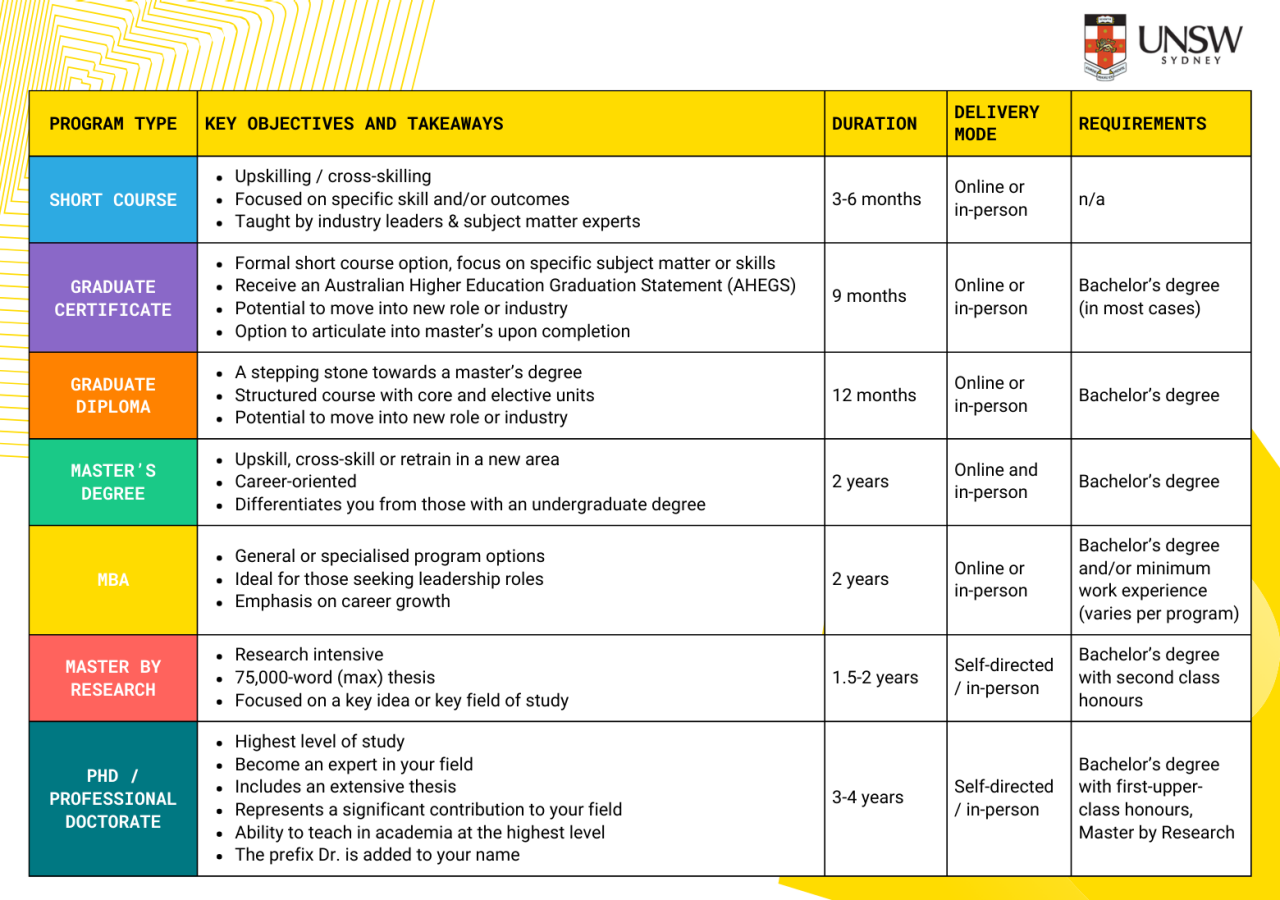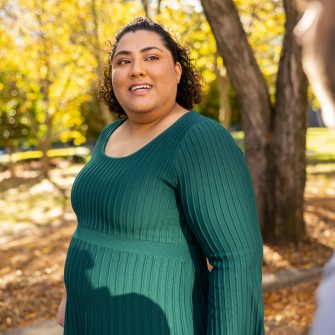Masters by Coursework vs. Masters by Research
What's the difference.
Masters by Coursework and Masters by Research are two distinct types of postgraduate degrees. Masters by Coursework programs typically involve a structured curriculum where students attend classes, complete assignments, and take exams. These programs are designed to provide students with a comprehensive understanding of a specific field or discipline. On the other hand, Masters by Research programs focus on independent research and the production of a thesis or dissertation. Students in these programs work closely with a supervisor to conduct original research and contribute new knowledge to their field. While Masters by Coursework programs offer a broader range of coursework and are suitable for those seeking a deeper understanding of a subject, Masters by Research programs are ideal for individuals interested in pursuing a career in academia or research.

Further Detail
Introduction.
When considering pursuing a master's degree, one of the key decisions to make is whether to opt for a Masters by Coursework or a Masters by Research. Both options have their own unique attributes and advantages, catering to different interests and career goals. In this article, we will delve into the characteristics of each type of master's program, highlighting their differences and helping prospective students make an informed choice.
Masters by Coursework
A Masters by Coursework is a program that primarily focuses on structured coursework and assessments. It is designed to provide students with a comprehensive understanding of a specific field or discipline. This type of master's program typically involves attending lectures, seminars, and workshops, and completing assignments, projects, and examinations.
One of the key advantages of a Masters by Coursework is its structured nature. Students are provided with a clear curriculum and a predetermined set of courses to complete. This allows for a more organized and predictable learning experience, making it easier for students to plan their schedules and manage their time effectively.
Furthermore, a Masters by Coursework often offers a wide range of elective courses, allowing students to tailor their studies to their specific interests and career aspirations. This flexibility enables students to gain a diverse skill set and knowledge base, which can be advantageous in a competitive job market.
Another benefit of a Masters by Coursework is the opportunity for networking and collaboration. Students in these programs often work closely with their peers, engaging in group projects and discussions. This fosters a collaborative learning environment, where students can exchange ideas, learn from each other's experiences, and build valuable professional connections.
Lastly, a Masters by Coursework is typically shorter in duration compared to a Masters by Research. This can be appealing to individuals who wish to complete their studies and enter the workforce sooner. The structured nature of the program also ensures a more efficient progression towards graduation.
Masters by Research
A Masters by Research, on the other hand, is a program that emphasizes independent research and scholarly inquiry. It is designed for students who have a strong interest in conducting original research and contributing to the existing body of knowledge in their field of study.
One of the key attributes of a Masters by Research is the opportunity for in-depth exploration of a specific research topic. Students are required to undertake a substantial research project under the guidance of a supervisor or mentor. This allows them to develop advanced research skills, including data collection, analysis, and interpretation.
Unlike a Masters by Coursework, a Masters by Research offers a higher degree of flexibility in terms of the research topic and methodology. Students have the freedom to choose a research area that aligns with their interests and expertise. They can also adopt innovative research methods and approaches, contributing to the advancement of knowledge in their field.
Furthermore, a Masters by Research provides students with the opportunity to develop critical thinking and problem-solving skills. Through the research process, students learn to analyze complex issues, evaluate existing theories, and propose novel solutions. These skills are highly valued in academia, research institutions, and industries that require individuals with strong analytical abilities.
Another advantage of a Masters by Research is the potential for publication and dissemination of research findings. Students often have the opportunity to present their research at conferences and publish their work in academic journals. This enhances their academic profile and can open doors to further research opportunities or doctoral studies.
Choosing the Right Path
When deciding between a Masters by Coursework and a Masters by Research, it is crucial to consider your personal interests, career goals, and preferred learning style. If you are passionate about conducting independent research, contributing to knowledge, and pursuing a career in academia or research, a Masters by Research may be the ideal choice for you.
On the other hand, if you prefer a structured learning environment, want to gain a broad understanding of a specific field, and aim to enter the workforce sooner, a Masters by Coursework may be more suitable. This option allows you to acquire practical skills and knowledge that can be directly applied in various professional settings.
It is also worth noting that some universities offer combined programs that incorporate elements of both Masters by Coursework and Masters by Research. These programs provide students with the opportunity to engage in coursework while also conducting a smaller research project. This can be a great option for individuals who wish to strike a balance between structured learning and research exploration.
In conclusion, both Masters by Coursework and Masters by Research have their own unique attributes and advantages. A Masters by Coursework offers a structured learning experience, flexibility in course selection, networking opportunities, and a shorter duration. On the other hand, a Masters by Research provides the opportunity for in-depth research, flexibility in research topics and methodologies, development of critical thinking skills, and potential for publication.
Ultimately, the choice between the two types of master's programs depends on your individual preferences, career aspirations, and learning style. It is important to carefully evaluate your goals and consider the specific offerings of each program before making a decision. Regardless of the path you choose, pursuing a master's degree is a significant step towards personal and professional growth, opening doors to new opportunities and expanding your knowledge in your chosen field.
Comparisons may contain inaccurate information about people, places, or facts. Please report any issues.
What's the difference between a Masters by Coursework and a Masters by Research?
A Master by Coursework is a professional qualification involving the study of a specified set of core units and a selection of eligible elective units. Undertaking a coursework program will mean that you will attend classes, complete assignments and sit exams where applicable. Some Masters by Coursework also require the completion of a minor thesis as part of the course. Depending on the course, part-time and online study options are available. For more information, please see our Postgraduate study at ECU webpage. A Master by Research involves the submission of a completed thesis based on an independent research project. Students studying a Master by Research work independently with the support of a supervisor and the School. Students may be required to attend units to help expand their skills in the area of research. For more information, please see our Research Degree webpage.
Explore ECU
Research Candidature
Application Process
Apply For Research
Manage Offer
Study At ECU
Supporting Documentation
I - Visa & Confirmation Enrolment
International Agent
Tracking My Application
What To Study
Published: 9 Sept 2024
9 Sept 2024 Knowledge
Question & answer, related articles.
- I've applied for the Master of Nursing (Graduate Entry). What is the Health Science Preparation program?
- Can I study a Doctorate or Master by Research online?
- Can I apply to exit from my Master of Teaching with a Graduate Diploma in Teaching?
- How do I postpone my Masters by Research or Doctorate program?
- Will my postgraduate studies give me credits towards a Masters degree?
Recently Viewed
To help us answer your question, choose one of these categories. 'Other' includes our graduates, industry partners or the general community.
Contacting ECU
- Got a Question? Ask Us
- Phone 134 328
- International: +61 8 6304 0000
- Campus Maps
- Campus Tours (VR)
Supplemental
- Copyright , Disclaimer
- Accessibility
- Privacy statement
- Report errors
- Template reviewed 16 Nov 2019
- CRICOS Provider No. 00279B
- RTO Code 4756
- TEQSA ID PRV12160, Australian University
Most popular questions asked by students
- What is the 'Official Welcome to ECU'?
- What is Orientation?
- When is my Orientation?
- What are my Orientation activities as an international student?
- What should I do if I have not received any information about Orientation?
Difference between Course based and Thesis based Masters Degree
Master's degree courses are of two types: course-based and thesis-based. This is the reason bachelor's degree graduates often get confused when it comes to choosing a course for their higher studies. However, in this article, we will talk about the difference between course based and thesis based master's degree to help you make an informed decision.

Before we get into the details of Taught Masters vs Research Masters , let us look at the answer to the question, “what are Masters Degrees?” Once a student has completed an undergraduate degree and wants to pursue further education, he/she can enrol himself/herself in a Masters Degree. After Masters Degree, students can pursue a PhD/M. Phil (Doctoral Degree).
There are two main types of Masters Degrees – course-based (taught) and research-based (Taught Masters and Research Masters). Course-based Masters Degrees are based on course modules taught through lectures, lab work, seminars or distance learning, while research-based Masters Degrees requires student to carry out their own research project in a specialized field of study. Research Masters Degrees normally take longer than taught Masters Degrees to complete.
Predict your IELTS, TOEFL, and PTE in just 4 steps!
Coursework programs have a structure consisting of core, elective and optional units and require enrolment in these units, attendance for any timetabled classes, and completion of assignments. Some postgraduate courses are now available through online study and attendance is not required there. Most Coursework based Masters have a research element and may require the completion of a minor thesis.
A masters degree by research requires the submission of a thesis that is based on an independent research project. Students who are doing a masters degree by research, work independently and get the support of their supervisors and school. In some cases, students are required to attend units in order to expand their skills in the area of research.
Also read: Difference between Master of Engineering (MEng) and Master of Science (MS)
Difference between Course based and Thesis based Masters
Explore m.a. colleges in uk.
Oxford, UK Public
London, UK Public
Edinburgh, UK Public
Manchester, UK Public
Cambridge, UK Public
Birmingham, UK Public
Leeds, UK Public
The key difference between course-based masters and thesis-based masters is the level of independence students will have while studying. In simple words, a course-based masters follows a similar format of an undergraduate degree. It will include things like lectures, workshops, and seminars. While doing a course-based masters, students will have to do their research and independent study but they will get guidance from their professors and tutors.
On the other hand, in a thesis-based masters, there will be very few taught classes. The focus of students will be on a large project or dissertation that will be totally based on their independent research. However, students will still have a tutor who will support them throughout their studies.
Coursework based Masters or Taught Masters Degrees
Taught masters degrees are similar to undergraduate degrees. They involve a series of taught modules, delivered through lectures, practical and work seminars. Upon completion of these modules you will be assessed on the skills and knowledge you have learned. Assessment is through coursework, examinations, group projects and dissertations. At the end of your course, you will be granted a Master of Arts (MA), Master of Business Administration (MBA), or Master of Science (MSc) qualification, depending on the subject of study.
Research based Masters Degrees
Research masters degrees involve learning through research. Research-based degrees are viewed as valuable preparation for undertaking PhD studies, with many funding bodies awarding money only to PhD students who have completed research programs. If you are considering a research masters, it is important for you to work independently as you will receive less tutor support than that on a taught degree. However, you will be granted support from supervisors who will help you develop your research proposal.
Majority of your days will be spent collecting and analyzing data. The aim of your efforts will be to have your work accepted for publication in a leading research journal. Assessment of research programs is through a professional judgment of your research work and verbal exam relating to your research topic. At the end of your course, you will be granted a Master of Research (MRes), Master of Science (MSc by Research), or Master of Arts (MA by Research) qualification, depending on the subject of study.
Which is better – Masters by Coursework or Research?
Masters by Coursework
A wide variety of subjects is available for students who want to do masters by coursework. The coursework-based masters is a better choice if students want to improve their employability by gaining advanced knowledge of a subject. This is relevant if students have a certain career in mind that requires a specific qualification.
Advantages of doing a Masters by Coursework
- Availability of a good range of subjects
- Chance of a great employability
- More time at hand with tutors/peers
Disadvantages of doing a Masters by Coursework
- Less flexibility
- Might be more expensive than a research master’s
Masters Degrees by Research
A research-based masters degree will allow students to have more freedom and flexibility to manage their own workload and study those areas and topics for which they are passionate. This degree can also give a starting point for a career where research is an important part.
Advantages of a Masters degree by Research
- Focus on a single topic of interest
- Get to know the bigger picture as to what PhD study will look like
- Helpful for research-based degrees
Disadvantages of a Masters degree by Research
- Lack of variety in subject areas
- Less development of a skill set since most of the research is independent
Taught Masters vs Research Masters Fees
The following table provides an estimate of the fees for different types of Masters Degrees offered in the UK .
Note: These figures are only an estimate. Students are advised to visit the official webpage of the university in order to know the exact fee details.
Taught Masters vs Research Masters FAQs
Q. What is better - thesis or course-based master's?
A. A masters by coursework is generally professional and vocational in nature and involves a series of set modules, whereas, a masters degree by research involves a significant and independent research project. In the Taught Masters, students complete a number of modules and credit hours and gain their degree. However, in the case of a Research Masters, the core element of their academics is their research.
Q. What is a coursework based masters?
A. Masters by coursework involves a study of specified core and elective units. While doing a coursework based masters, you will have to attend classes, complete assignments, and appear for exams, as applicable. This is more or less similar to an undergraduate degree curriculum where a student needs to complete a set of modules and credit hours.
Q. What is the meaning of a research-based masters degree?
A. A masters degree by research is an advanced research-based degree that allows students to focus on a particular topic in-depth and independently. In a Research Masters, a student focuses on his/her research topic or project. The entire theme of the degree is that research project or research work. If you are interested in pursuing research, you can opt for a MRes Degree.
Q. Why should I do a research-based masters?
A. A research-based masters is ideal if you have an interest in extensive academic research, want to enhance your research skills, and ultimately want to narrow your focus to a more specialized field of study. Moreover, if you wish to pursue research in your profession, you should opt for a Research Masters (MRes) degree.
Q. Which is better, masters by coursework or research?
A. Masters by coursework is usually a better option if you want to improve your employability by gaining advanced knowledge of a subject. However, a masters degree by research can give you more flexibility and freedom to know about the study areas for which you are passionate.
Q. Which is better, master's with thesis or without thesis?
A. Whether a Master's with or without a thesis is better depends on your specific goals and interests.
- Master's with Thesis: Ideal for those interested in research, academia, or specialized roles. Offers in-depth knowledge and research skills.
- Master's without Thesis: Focuses on practical skills and industry applications. Suitable for those seeking immediate career opportunities.
Consider your long-term goals and career aspirations to make the best choice.
Q: Why indian students choose to study at Hult International Business School - UK?
Indian students choose to study at Hult International Business School in the UK for several reasons, including its highly ranked programs, global outlook, and career support. Hult offers a range of full-time master’s degrees, immersive bachelor's programs, and MBA options that prepare students to excel in the global job market. The school is the largest and top-ranked global business school, providing students with an incomparable universal outlook. Additionally, Hult's focus on experiential learning, extensive career support, and the opportunity to study at multiple campuses around the world are attractive to Indian students seeking a global business education. Furthermore, the school's emphasis on innovation and meeting the needs of students and employers may also contribute to its appeal to Indian students
Q: How to prepare for UK 10th board exam 2025?
Those who are preparing for the UK Class 10 exam 2025 are recommended to follow the tips below.
- Know the exam pattern
- Make a proper time table as per the syllabus
- Solve previous year question papers
- Make short notes of important formulas and theorems
- Revise regularly
- Figure out weaker areas and learn them well
With proper planning and hard work, students can easily clear the UK 10th board exam.
Q: How can I get admission in the University of Manchester?
The application process at the University of Manchester may vary depending on the course and level of study. However, here is the application process for UG and PG courses:
The Undergraduate Application Process:
Step 1: You can apply through the UCAS common application portal.
Step 2 : Go to the website and select the course you are interested in.
Step 3 : Ensure you meet the Entry requirements (Academic qualifications, English proficiency, etc.
Step 4: Once you decide on the course, submit documents such as SOP, Transcripts and personal statements.
Check out: tips to improve your SOP .
Step 5: You can track the application's progress through your given credentials by UCAS.
Step 6: Once the applicant submits the application to UCAS, it forwards to the University, and the admission teams carefully analyse the application document.
Step 7 : The university will send you an offer letter once selected. Hence keep checking your UCAS portal for your application status.
The Postgraduate application process:
Step 1: Select the postgraduate course you are interested in from the University of Manchester.\
Step 2: Ensure you meet the entry requirements for the chosen program, as they vary depending on the course.
Step 3: Complete the online application by providing your personal information.
Step 4: Upload the required documents, such as Academic transcripts and proof of English language proficiency ( TOEFL/ IELTS). experience in your fields and references (depending on the course). You also may require Two LORs depending on the course.
To make your admission better, check out the following: How Admission Officers Evaluate your application.
Step 5: If your application is successful, you will receive an offer from the University of Manchester.
Q: Does the University of Essex require IELTS?
International students whose native language is not English must meet the University of Essex English language requirements to get admission. The university accepts IELTS scores as proof of English language proficiency. Mentioned below are the IELTS scores required for UG and PG admission at the university:
The university also accepts the score of other English language tests such as TOEFL and PTE for admission to undergraduate and graduate programs:
Also read: Required IELTS Score for UK Universities
Q: Is university of West of Scotland good for international students?
The University of the West of Scotland has five modern and diverse campuses in United Kingdom. The University has welcomed more than 3,000 international students which are representing 1/3 of the globe. They also have 130 European partners who are actively in global study and exchange options through the Commonwealth universities programmes. The University also offers study abroad opportunities for UWS who are eligible for the same and also have more than 20 transnational education partners worldwide which helps them deliver UWS Bachelors and Masters Degrees around the world.
Q: What is University of Wales, Trinity Saint famous for?
University of Wales, Trinity Saint (UWTSD) was founded in 2010 , is a public institution for higher education and research at multiple locations. It was set up under the 1828 royal charter of Lampeter, the institution was the result of the merger between Trinity University College and the University of Wales. The institution merged with the Swansea Metropolitan University in 2013.
- Top Ranked University : The UWTSD is not ranked by any major ranking body, however as per the university ranking given on the official website of the university, it is ranked among:
- #1 st in Wales and UK Top 5 Film Production and Photography
- #1 st in Wales and UK Top 5 Fashion and Textiles
- #1 st in Wales and UK Top 20 Graphic Design
- #1 st in Wales and UK Top 5 Education
- #1 st in Wales and UK Top 20 Sports Science
- #1 st in Wales and UK Top 20 Mechanical Engineering
- #1 st in Wales for Fine Arts
- Variety of Courses: UWTSD offers more than 300 programs at various levels including undergraduate, postgraduate degrees as well as multiple online courses .
- Highly distinguished and learned faculties : the faculty at UWTSD is highly learned and distinguished which enables students to be the best in their field of study.
- High Placements : According to Graduate Outcome data 2019-2020 quoted by the UWTSD, more than 95% of its graduates were found to be employed within 15 Months of graduation . The average salary of a graduate is not explicitly released by UWTSD, however, as per some unofficial sources the average salary of the graduates of UWTSD is approximately INR 30-35L. with the highest salary being reported as high as INR 66.5L for jobs in Financial Services .
Q: What rank is Wolverhampton University in UK?
The University of Wolverhampton is one of the best universities in the United Kingdom . The university is consistently ranked among the best universities nationally and globally. For nearly 200 years , the University of Wolverhampton has been consistently providing a quality of education to students and producing highly skilled graduates. The national rankings of the University of Wolverhampton are given below:
Q: What is your review of Central Lancashire University?
University of Central lanchester surely a good option for international students mainly beacuse of a diverse range of excellent academic programs across its professional schools and colleges .
Here are the reasons why you should go for UCLAN:
Academics: University of Central Lancashire offers a range of over 350 undergraduate programs as well as more than 200 graduate programs for their international students. Below are some famous courses the university is highly famous for:
- Arts, Engineering, Applied & Biomedical Sciences;
- Business & Management;
- Psychology;
- Social Science;
- Community Service;
- Design & Fashion;
- Medicine & Nursing;
- Language & Global Studies;
- Journalism;
- Media Studies; and
Location of the university - The Universit of Central Lanchester is in a location where arts & culture, technology industry and entertainment industry providing endless internship. International Students have access tooutdoor activities, live music/performances and attractions which makes their make campus life more enjoyable. The location gives students an additional mark to study at UK.
Ranking: According to global ranking partner THE (Times Higher Education) University Ranking, University of Central Lancashire ranking is 1001-1200 in Best Global Universities, which is Improving from 801-1000 in 2022.
Fees: : The cost of attending UCLAN for Indian students can vary depending on several factors. Tuition fees for international students at UCLAN are typically higher than for UK citizens. However, it is important that the tuition fee can change over time, and it is recommended to visit the official website to recheck the fees and accommodation. Indian students should also consider other costs such as housing, health insurance, meals and transportation attending UCLAN.

Priya Garg is a seasoned content writer and editor. With her rich experience in content writing, teaching and research & analysis, Priya believes in providing only the correct information which is also up-to-date. H... Read Full Bio
- Universities in UK 175 Universities
- Universities in USA 1036 Universities
- Universities in Canada 174 Universities
- Universities in Australia 122 Universities
- Universities in Ireland 33 Universities
- Universities in New Zealand 70 Universities
Related Articles
Masters in literature and creative writing in uk, list of top high salary courses after 12th to study abroad, msw abroad: full form, top colleges, courses, jobs, difference between graduate and undergraduate, best psychology universities in the world 2024-25, pg diploma in canada or masters in europe.

Guilherme Mazui
- What is the Difference Between Masters by Coursework and Research?
The main difference between a Master's by Coursework and a Master's by Research lies in the nature of the study and the focus of the program. Here are the key differences:
Master's by Coursework :
- Professional and vocational in nature.
- Involves a series of set modules, with a structure consisting of core, elective, and optional units.
- Taught through lectures, lab work, seminars, or distance learning.
- Offers a good range of subjects and improved employability.
- Provides more time with tutors and peers.
- May involve a research element, such as the completion of a minor thesis.
Master's by Research :
- Focuses on the completion of a significant, independent research project.
- Offers more freedom and flexibility in managing the research process.
- Provides a starting point for a career where research is an important part.
- Requires enrollment in research units and involves attending timetabled research classes.
- Normally takes longer than taught Master's degrees to complete.
- Involves working on a solo research project under the guidance of an academic supervisor, with the aim of producing, presenting, and submitting a final thesis.
In summary, a Master's by Coursework is more focused on professional development and vocational skills, while a Master's by Research emphasizes independent research and original contributions to a field of study. The choice between the two depends on your goals, interests, and career aspirations.
Comparative Table: Masters by Coursework vs Research
Here is a table comparing the differences between Masters by Coursework and Research:
As you can see, Masters by Coursework is structured around taught course modules, while Masters by Research is more focused on conducting independent research. The choice between the two depends on your career goals and preferences for learning and study structure.
- Graduate vs Masters
- MSc by Research vs MPhil
- PhD vs Masters
- MBA vs Masters
- Honors vs Masters
- Case Study vs Research
- Undergraduate vs Postgraduate
- Undergraduate vs Graduate
- Teachers vs Masters
- MPhil vs PhD
- Graduate Diploma vs Diploma
- MSc vs MPhil
- Theory vs Research
- Graduate Diploma vs Postgraduate Diploma
- M.Sc vs MBA
- Research vs Scientific Method
- Thesis vs Dissertation
- MSc vs Post Graduate Diploma (PGDip)

Types of postgraduate degrees at UNSW

Postgraduate study opens doors – to new job opportunities, accelerated career progression, increased earning potential and mastery in your field.
It’s an opportunity to push yourself, your academic abilities and your professional potential to new heights. But which postgraduate program is the right move for you? Let’s run through the various types of postgraduate degrees together.
What is a postgraduate degree?
A postgraduate degree is an advanced academic qualification often pursued after completing an undergraduate program. Postgraduate programs include master's degrees, graduate diplomas, graduate certificates, and doctoral degrees. These programs offer specialised, in-depth study in a specific field. They provide advanced knowledge, research skills and expertise.
Postgraduate degrees are designed to enhance career prospects, deepen understanding within a chosen discipline and often involve research or professional development to prepare individuals for specialised roles or further academic pursuits.
What types of postgraduate degrees are available?
Postgraduate degrees in Australia encompass diverse options such as graduate certificates, graduate diplomas, master's by coursework, master’s by research, and doctoral degrees such as the Doctor of Education (EdD), Doctor of Philosophy (PhD) and Professional Doctorates across various disciplines and fields of study.
Here's a snapshot of the differences between each type of postgraduate degree.

Postgraduate degrees at UNSW

Short Courses
Short courses are ideal for people already working in their chosen sector who want to accelerate their career growth or break into a new field. You can often choose a blend of in-person and online learning and customise your study load around existing commitments. At UNSW, our short courses are run through the Australian Graduate School of Management (AGSM) and are ranked 29th in the world.*
*Financial Times 2023 Executive Education Combined rankings


Graduate Certificate
A graduate certificate is a short, focused postgraduate program offering specialised knowledge in your chosen field. Usually completed in 6-12 months, graduate certificates often serve as a pathway to further postgraduate study but they can be standalone programs that provide professional development and unlock faster career progression.

Graduate Diploma
Similar to a graduate certificate, a graduate diploma is a relatively short postgraduate program that offers specialised knowledge and skills in a specific area. It's shorter than a master's degree, typically taking one year of full-time study to complete. It provides advanced learning and expertise, providing a pathway to further study or professional advancement in a focused field.

Master’s Degree
A master's degree – sometimes called a master’s by coursework – is a postgraduate qualification that is generally obtained after completing a bachelor's degree. It involves further study and specialised knowledge in a specific field, such as Master of Commerce , Master of Engineering , or Master of Business Administration (MBA). The program contains predetermined coursework and may include a research or professional placement element. Typically, it requires one to two years of full-time study.

An MBA or Master of Business Administration is a highly regarded degree for professionals wanting to excel in business or leadership roles in any industry. UNSW offers a range of online and hybrid MBA programs, run by the Australian Graduate School of Management (AGSM) . Our core MBA program is ranked #1 in Australia** and is designed to help candidates accelerate their career growth, move into a new industry or start their own business.
**Financial Times 2023 Global MBA Rankings

Master's by Research
A Master by Research focuses on independent study and original research within a specialised area. Unlike a master’s by coursework that has predetermined modules and learning outcomes set out by the faculty, a master’s by research is a self-led, research-focused program. Students undertake in-depth investigations, culminating in a thesis or dissertation that demonstrates their contributions to the field. This program emphasises critical thinking and research methodology and typically takes one to two years of full-time study.

PhD or Professional Doctorate
A PhD or professional doctorate is the highest academic qualification. A PhD emphasises original research, contributing new knowledge to a field. Professional doctorates blend research and practical application, aimed at professionals seeking advanced expertise in their field. Both require a thesis or dissertation, taking three to six years of full-time study.
The average cost of a postgraduate degree in Australia varies based on the program, duration and institution. On average, tuition fees for postgraduate courses range from $6,000 to $11,000 per year.
Please note, these figures are estimates only and will vary based on your personal circumstances. Fees and costs are subject to change without notice.
A postgraduate diploma typically requires more credits or coursework than a postgraduate certificate, usually spanning one to two years of study. While both are advanced qualifications, a postgraduate diploma offers a more extensive curriculum and depth of study, often serving as a pathway to a master's degree.
Choosing the right postgraduate study involves assessing your career goals, interests and desired outcomes. Consider factors like program relevance to your field, faculty expertise, university reputation, available resources and opportunities for research or practical experience. Make sure the program aligns with your aspirations for professional growth and personal development.
Connect with us
Sign up to our newsletter - we'll keep you updated on degree information, scholarships and upcoming events.
Ready to explore your study options?

Distinguishing Between Masters by Coursework & Research Programs
In many universities, students have the option to complete a master’s degree through regular coursework, through research, or a combination of both. This is a significant change from when such degrees required a specific number of coursework hours. Now, both masters by coursework and research carry weight and students can choose to complete their degree by selecting any of the components. However, there may be specific requirements depending on the program, so students should look into these before making a decision.
Masters by Coursework
As the name suggests, the main component in Masters by coursework is regular attendance of lectures and tutorials. Students must fulfill assessment requirements, such as essays and assignments. However, even in Masters by coursework, there is a small research component where students work under the supervision of professors and submit a thesis of their project for assessment. Some courses, like doctorates, are defined as coursework even though a significant part of the degree consists of research.
Masters by Research
Masters by research courses are dominated by research work, and lecture attendance is not as important as in coursework. Typically, a master’s degree through research has a research component of up to 70% in comparison to regular classroom lectures. Masters by research can be considered a mini PhD, as students are not required to attend classes or write exams to complete coursework. If there are preliminary courses, they are designed to provide a foundation for the student on the subject, and the majority of the content is given to the student through a supervisor who helps and assists in research.
Key Takeaways
- Masters by coursework and Masters by research have different program content.
- Coursework requires more lecture attendance than masters by research.
- Masters by research is more similar to a mini PhD.
LEAVE A REPLY Cancel reply
Save my name, email, and website in this browser for the next time I comment.
Related Articles
Difference between power & authority, distinguishing could of & could have, distinguishing pixie & bob haircuts, distinguishing between debate & discussion, distinguishing between dialogue & conversation, distinguishing between a present & a gift, distinguishing between will & can, distinguishing between up & upon.

Difference between Masters by Coursework and Masters by Research in Australia

Many students who decide to pursue a Masters degree in Australia, come across these options for studies:
- Masters by Coursework
- Masters by Research
Some students might not know what is the difference between two and which one they should choose?
So, in this article, we are explaining about the difference between Masters by Coursework and Masters by Research in Australia.
And some tips to help you to decide which one might be better for you.
So, let’s get straight to the business.
What is Masters by Coursework?
Master’s by coursework is a degree program where students must study specific core subjects and electives in a structured way to complete their degree in a chosen field of study..
Students are usually required to:
- Attend classes/seminars/lectures/tutorials
- Complete assignment tasks
- Undertake exams
Students might need to complete some minor thesis as a part of this course too, but that is not the case for most of the Masters by Coursework programs.
Students doing Masters by coursework may have a chance to undergo a practical training or internship as a part of the course as well.
Usually, the durations of the Masters by Coursework lasts anywhere between 1 and 2 years.
To do a Masters by Coursework, a student must have completed at least Bachelor degree in related discipline.
Type of Courses for Masters by Coursework
Some of the popular courses for Masters by Coursework among students include:
- Masters of Professional Accounting
- Master of Business Administration
- Master of Information Technology
- Master of Engineering
- Masters of Science
- Masters of Law
- Masters of Education
- Masters of Architecture
- Masters of Nursing
- Masters of Psychology
- Masters of Agriculture Science
There are many other courses that you can choose to study apart from the one listed above.
What is Masters by Research?
Masters by Research is degree program where students are expected to undertake a research project under the guidance of a supervisor. The main focus is to conduct an original research and contribute to the knowledge in particular field of study.
Students are expected to conduct the research, gather all the data and then analyse it for the purpose of producing a thesis on their research outcome.
Masters by Research students are usually not expected to attend any classes or do assignments or sit in an exam. However, some universities in Australia might have some coursework in research units as well.
Students in this degree program are required to create a research proposal and then after getting approval from their supervisor, they start working on it.
The length of a thesis is usually expected to be between 50,000 words to 75,000 words for Masters by Research depending on the university.
For a Master’s by Research, universities typically require either research experience or a Bachelor’s degree in a related field, with an Honours degree.
The duration of Masters by Research can vary depending on the type of research. However, it can be from 1 year full-time study to 4 years part-time study.
Type of Fields for Research in Masters by Coursework
Students can choose to do the research in different fields when doing their Masters by Coursework like:
- Engineering
- Mathematics
- Environment
There are so many other fields that you can choose to do your research in.
What is the difference between Masters by Coursework and Masters by Research in Australia?
There are many difference between these two postgraduate qualifications. Let’s discuss them:
- Focus: Masters by Coursework focus on set curriculum while Masters by Research focus on independent research.
- Structure: Masters by Coursework Students are required to attend regular classes, submit assignments and undertake exams while in Masters by Research students are expected to conduct research and produce a thesis.
- Duration: Masters by Coursework usually have a fixed duration of 1 to 2 years while Masters by Research can vary depending on type and requirements of research.
- Career outcomes: Masters by Coursework students usually have a very specific career outcome in typical professions. While Masters by Research students usually undertake this course to do a PhD or career in research areas.
- Entry requirements : Entry to Masters by Coursework require students to have a minimum of Bachelor degree in related field. However, a research experience or honours degree might be required to get an entry into Masters by Research.
- Work Hours: Master by Research students can work unlimited hours during their course, while Masters by Coursework students need to abide by work hour restrictions as per the student visa conditions.
Work hours for Masters by Coursework and Masters by Research in Australia
From 1st July 2023 , international students in Australia can work 48 hours per fortnight while their course is in session. International students can work unrestricted hours during their official school holidays.
So students undertaking Masters by Coursework will have to abide by these limited work hour conditions. However, students undertaking Gradute Research programs like Masters by Reserach or PhD. are exempt from this work limitation.
So, students completing Masters by Research can undertake a full-time work while completing their degree program. However, keep in mind that Masters by Research is quite involved and demanding program.
Your supervisor might allow for flexible start and end times for your research, but it still requires a great deal of effort.
So, in reality, you might not be able to work full-time even if you have full working rights due to the amount of work involved in the research courses.
However, if you are coming along with your dependent for studying any of these courses, then they can work full-time hours while you are studying.
If you want to know more about work hours in Australia for international students, then you should consider checking this article .
Choosing the right Masters degree
Last but not the least, which degree should you choose?
It depends on heaps of factors including:
- Interest in Research: Consider your interest in research. How much are you interested in conducting an independent research on a chosen topic? If you want to explore a specific topic of interest, then Masters by Research might suit you better. However, if you prefer a structured learning environment, then Masters by Coursework might be better.
- Career goals: What are your career objectives and goals are? What do you want to achieve in your career and what career outcomes you are hoping to achieve? If your goal is to complete a PhD or focus on specific research topic and want to contribute to the knowledge in the field, then Masters by Research is your thing. However, if you are looking to thrive in a specific career or profession, the Masters by Coursework is right fit for you.
- Ability to work independently: Masters by Research program require a lot of independent research and self-motivation. Assess your ability in these factors and decide if the Masters by Research is right fit for you. If you prefer to have a structured learning with clear course outlines, then consider Masters by Coursework.
- Availability of scholarships: While there can be scholarship options for Masters by Coursework program, it is likely that Masters by Research may even have other financial assistance along with scholarships as well. You should consider this and your financial situation as well.
- Personal preference and strengths: You have to be honest to yourself and know your academic strength when choosing any course. This is no different in case of choosing Masters by Coursework and Masters by Research. Masters of coursework will involve completing assignment tasks, undergoing exams, etc. While in Masters of Resarch involves lots of research and analytical skills. Which area do you thrive in? Only you know the answer.
We hope you understand the difference between Masters by Coursework and Masters by Research in Australia. We want to know which course would you like to study in Australia? Let us know in the comments.
Share this article:
Related posts.

Blog , Life in Australia
List of Major Christmas Events in Australia – 2024

Epic Black Friday & Cyber Monday Deals in Australia 2024 For Students

Blog , Work in Australia
A Students Guide to Becoming a Freelancer in Australia
Home About Us Contact Us Why Australia
Student Discounts Search Flights Latest News Student Guide
Blog Downloads Infographics Quiz
STUDENT LIFE
Explore OZ Study Work Live
Search Courses Student Discounts Accommodation Search Student Guide

IMAGES
COMMENTS
In conclusion, both Masters by Coursework and Masters by Research have their own unique attributes and advantages. A Masters by Coursework offers a structured learning experience, flexibility in course selection, networking opportunities, and a shorter duration.
A Master by Coursework is a professional qualification involving the study of a specified set of core units and a selection of eligible elective units. Undertaking a coursework program will mean that you will attend classes, complete assignments and sit exams where applicable. Some Masters by Coursework also require the completion of a minor ...
Coursework degrees aim to deepen your knowledge and enhance your undergraduate degree with postgraduate training, focusing you towards a specific profession. Alternatively, you can use your undergraduate degree to pivot and pursue a new area of study at postgraduate level. ... Students considering a research master's or PhD are strongly ...
Masters by Coursework. A wide variety of subjects is available for students who want to do masters by coursework. The coursework-based masters is a better choice if students want to improve their employability by gaining advanced knowledge of a subject. This is relevant if students have a certain career in mind that requires a specific ...
Master Degree by Coursework. A coursework-based master's programme, as the name suggests, revolves predominantly around coursework. This pathway closely resembles the structure of undergraduate degrees. 1. Programme Structure. In a coursework programme, students attend lectures, engage in tutorials, complete assignments, and sit exams.
Masters by Coursework Masters by Research; Structure: Based on course modules taught through lectures, lab work, seminars, or distance learning. Focuses on a single research project, with more freedom and flexibility to manage the study schedule. Learning Outcome: Improves employability by enhancing skills and knowledge in a specific field.
A master's degree - sometimes called a master's by coursework - is a postgraduate qualification that is generally obtained after completing a bachelor's degree. It involves further study and specialised knowledge in a specific field, such as Master of Commerce, Master of Engineering, or Master of Business Administration (MBA). The program ...
Graduate coursework options. You can apply for more than 340 award programs ranging from Graduate Certificates to Masters and PhD study in a wide range of study areas and disciplines. Graduate degree options include: Graduate certificates. A Graduate certificate is six month course where you can choose from more than 25 discipline areas.
However, even in Masters by coursework, there is a small research component where students work under the supervision of professors and submit a thesis of their project for assessment. Some courses, like doctorates, are defined as coursework even though a significant part of the degree consists of research. Masters by Research
Students doing Masters by coursework may have a chance to undergo a practical training or internship as a part of the course as well. Usually, the durations of the Masters by Coursework lasts anywhere between 1 and 2 years. To do a Masters by Coursework, a student must have completed at least Bachelor degree in related discipline.